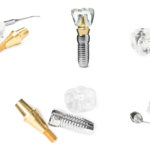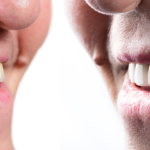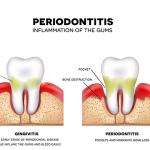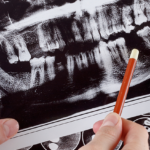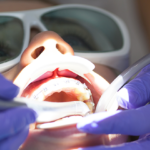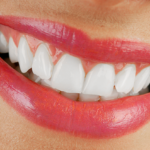Understanding Dental Crowns: Types and Materials
The Cost-Effective Solution for Dental Crowns: Dental Tourism and Affordable Options in Mexico
According to the American Dental Association’s glossary of dental terms, a dental crown is an artificial replacement that restores missing tooth material by surrounding the remaining tooth structure or is placed on a dental implant. Dental crowns are made of metal, ceramic, or polymer materials or a combination of these materials. Dental crowns are retained by luting cement or mechanical means.
Simply put, a dental crown is a cap placed over a compromised natural tooth to restore its shape, size, strength, and function. Generally, a dental crown can last up to 15 years, depending on your dental habits, chewing patterns, and nighttime grinding. Unfortunately, dental crowns across the U.S. are generally costly, averaging over $1,200.00. Fortunately, with the emergence of dental tourism or traveling across borders to receive affordable dental care, Americans can save a lot of money on their dental crowns. Dental offices in our referral programs are experts in porcelain fused to metal (PFM), all-porcelain, and zirconia crowns.
Why Are Dental Crowns Necessary?
There can be many reasons a dental crown is necessary:
- The tooth is weakened, broken, or worn and must be restored.
- A dental crown may be required to cover and protect a tooth with fillings, leaving little of the remaining tooth.
- To conceal discolored or otherwise damaged teeth for cosmetic reasons.
- To hold a dental bridge in place or to cap a dental implant.
- To conceal misshapen or discolored teeth.
- Teeth that have had root canal treatments.
The Process of Getting a Dental Crown
Depending on the dental clinic location, the dental crown procedure usually requires one or two visits. This usually involves some tooth filing to ensure the dental crown can fit over the remaining tooth structure. In cases of extreme damage to the original tooth, or if the roots are damaged to the point that they can’t support the dental crown, a root canal may be performed first.
Then, the dentist will take either a physical impression or a digital image to determine who will fabricate the replacement dental crown to fit correctly in the space and accommodate your bite. If the impression has to be sent to an off-sight lab, a temporary dental crown covers the prepared tooth until the permanent crown is placed.
You may also hear the terms “on-lays” or “3/4 crowns”. These variations from traditional dental crowns involve covering less of the natural tooth. As expected, these variations cover less of the underlying tooth and are used only in exceptional circumstances.
If you’re fitted with a temporary crown, there are some precautions we recommend:
- Avoid sticky or gummy foods such as gum or caramel candy on the side where the temporary is placed.
- When you can chew more frequently on the other side of your mouth
- Alter your flossing techniques. Slide floss through and out the side, rather than lifting the floss between the teeth, which can dislodge the temporary dental crown
What Types of Dental Crowns Are Available?
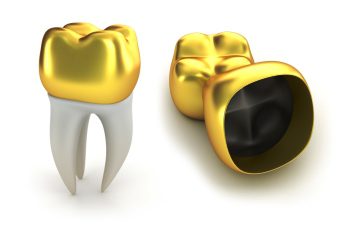
Metal Dental Crowns: These dental crowns could include gold, base metal alloy (nickel or chromium), or other alloys (palladium). Since the color is less desirable, this option is not the most popular. But they do have excellent longevity. Often, they may be an option in the less visible quadrants of the mouth.
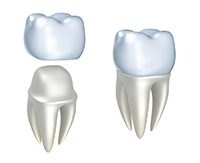
Porcelain-Fused-to-Metal Dental Crowns: Porcelain-fused-to-metal dental crowns are often used for the most visible teeth, such as the front teeth. These dental crowns are usually undetectable with the porcelain outer appearance and match your original teeth.
All-Ceramic or All Porcelain Dental Crowns: While not as strong as porcelain-fused-to-metal crowns, all-porcelain or all-ceramic dental crowns are the most realistic, especially for the front teeth. Still, many prefer ceramic or porcelain dental crowns because they are the most biocompatible material. In addition, they are unlikely to cause adverse reactions in the patient.
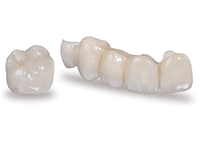
Zirconia: This makes a good base for porcelain dental crowns because it bonds well and strengthens the dental crown. This material has been used for years in dental restoration. It is still metal, so if someone is acutely reactive to metals, they may want to be tested for reactivity first. However, it creates an excellent cosmetic result.
How Much Do Crowns Cost, and How Much Can I Save with Beyond Borders Dental?

Calculating Savings: Affordable Options for Dental Crowns in Mexico.
The cost for a dental crown can vary widely by factors such as local competition in your city or even where you live in the U.S. Crowns usually cost $1,000.00 to $1,500.00 per crown. However, prices start at $490.00 for a porcelain fused to metal (PFM), which is a savings of over $1,000.00 per crown in some cases. Our approved dental clinics use the same materials as those used in the U.S. For a more detailed breakdown of cost savings, check out our How Much Can I Save page on Dental Care.
You may also have questions about the quality of dental care in Mexico due to the price disparity; be sure to visit our What About the Quality? Page. An extensive survey explains that 90% of people getting dental work from dentists in Mexico were satisfied with their treatment, which was either “good” or “excellent.” You will also learn important information about the inconsistencies of dental care in the U.S.
Problems that Can Arise with Dental Crowns

Suffering in Silence: The Pain of Dental Issues Without Access to Affordable Care.
In most cases, dental crowns are well-accepted by the body and cause few problems. While there may be sensitivity in the beginning, this usually resolves quickly. If you have a continuing sensitivity issue, you could consider one of many special kinds of toothpaste developed for tooth sensitivity. If your bite does not feel right, the height of the crown may need to be adjusted. This is easily adjusted and not uncommon.
A dental crown may become loose or even fall off in some cases. Many things can cause this, including a lack of adequate cement at the time of permanent placement or, in some cases, an improper fit.
In sporadic cases, dental crown materials or the cement used can cause an allergic reaction. However, extensive research has been used to develop biocompatible materials, and it is improbable that you will have such a reaction.
If you have questions or need additional information, please Contact Us or Request a Quote to send us your dental inquiry, and we’ll get back to you.



